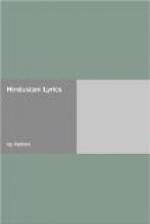Wali: of the Deccan, the first to write an Urdu Diwan: is considered the Father of Urdu poetry: born at Aurungabad, wrote in the latter half of the 17th century. He held a just balance between Sunnis and Shiahs, and did not flatter any Ruler in his verses. He knew the literature and art of Europe and wrote many mystical and spiritual poems.
YAKRANG: one of the officers of the Emperor Muhammad Shah (r. 1719-48): lived in dignity and honour at Delhi.
Zahir: a well-known modern poet, lived at Rampur at the Court of Nawab Kalbe Ali Khan, afterwards at the Court of the Nawab of Tonk, and finally at Hyderabad, in the literary circle of the Nizam, by whom he was much appreciated and rewarded.
ZAUQ: a celebrated poet at the Court of Bahadur Shah (r. 1837-57): was his teacher in the arts of verse: compiler of an anthology Of poems: is said to have written one hundred thousand verses: is still highly popular and much quoted.
Zafar: or Bahadur Shah, was the Padishah of Delhi, the last Mogul Emperor, and lived 1768-1862: son of Akbar II.: was over 60 years of age when he came to the throne: himself a poet and a good judge of music and painting, he gathered round him literary men and artists: of fine countenance and distinguished manners, and extremely loved and admired by his subjects: skilled in all kinds of poetry, and some of his ghazals continue to be popular: author of a voluminous Diwan, and a Commentary on the Gulistan of Saadi: a clever caligraphist, wrote with his own hand passages from the Koran for the ornamentation of the principal Mosque of Delhi. His son Dara was also a poet. At the Mutiny in 1857 he was taken prisoner and sent to Rangoon: there he continued to write verses, and died at an advanced age. His portrait, which forms the frontispiece to this book, is from a miniature kindly lent by the Indian Section of the Victoria and Albert Museum, South Kensington.
J.D.W.
Dulwich Village, London.
October, 1918.
I.
Thou tak’st no heed of me,
I am as naught to thee;
Cruel Beloved, arise!
Lovely and languid thou,
Sleep still upon thy brow,
Dreams in thine eyes.
From out thy garment flows
Fragrance of many a rose—
Airs of delight
Caught in the moonlit hours
Lying among the flowers
Through the long night.
Look on my face how pale!
Will naught my love avail?
Naught my desire?
Hold it as gold that is
Cleansed of impurities
Tried in the fire.
Pity my heart distrest,
Caught by that loveliest
Tress of thine hair,
So that I fear the shade
Even by thine eyebrows made
O’er eyes so fair.
ABRU.
II.
Thou, Sorrow, wilt keep and wilt cherish the memory
of me
Long after my death,
For thou dwelt at my heart, and my blood nourished
thee,
Thou wert warmed by my breath.




